|
||||||||||
| Home Nation World Business Opinion Lifestyle ChinAfrica Multimedia Columnists Documents Special Reports |
|
||||||||||
| Home Nation World Business Opinion Lifestyle ChinAfrica Multimedia Columnists Documents Special Reports |
| China-Africa Cooperation in Fighting COVID-19 |
| An Epic Battle |
| China rallies its human and material resources to fight the novel coronavirus |
| By Hu Fan ·2020-02-25 |
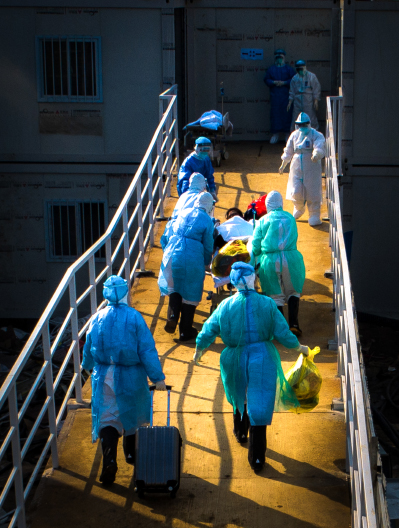
Medical workers transport patients infected with the novel coronavirus to the Huoshenshan Hospital in Wuhan, central China's Hubei Province, on February 4 (XINHUA)
When the second medical expert group sent by the National Health Commission (NHC) to Wuhan, capital city of central China's Hubei Province, confirmed the novel coronavirus' ability of human-to-human transmission on January 18, the Chinese Lunar New Year, or the Spring Festival, traffic rush had already been eight days. Authorities had previously estimated a total number of 3 billion trips during the one-month holiday season. Before the decision was made to seal off Wuhan on January 25 to prevent the spread of the virus, many people had already left the city, most of whom were from other cities of the province working in Wuhan.
During the early days of the outbreak of the novel coronavirus pneumonia, later named by the World Health Organization (WHO) as COVID-19, the number of confirmed infections increased rapidly, especially in Wuhan, with many suspected cases yet to be confirmed due to a lack of diagnostic capacity. Flooded by patients, hospitals were badly in need of medical materials. Their stock of protective equipment ran out in days and their hospital staff were in chronic need of rest.
Warned by experts about the danger of infection, people already in Spring Festival mood rushed to stores for masks, only to find they were sold out. Worse still, factories of medical supplies across the country were not able to operate at full capacity because of staff being off for the holidays.
On January 25, the day of the Spring Festival, Chinese President Xi Jinping chaired a meeting of the Standing Committee of the Political Bureau of the Communist Party of China Central Committee, where decisions were made to establish a leading group to manage containment of the epidemic and send overseeing teams to Hubei and other severely affected areas. Xi later called the battle against the virus a major test of China's governance system and capacity.
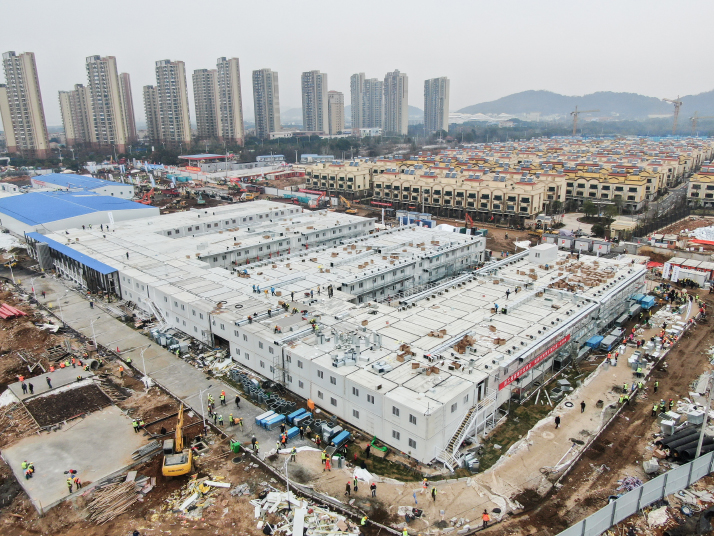
An aerial photo of the Huoshenshan Hospital in Wuhan on February 2 (XINHUA)
Rapid response
At dawn of January 25, the first team providing medical assistance arrived in Wuhan from Shanghai. They were there to help Jinyintan Hospital, where the most critical patients at the time were hospitalized.
Other teams followed. By February 13, over 20,000 medical practitioners in 180 teams were sent to Hubei, over 7,000 of whom were intensive care professionals. These are China's elite medical teams, with many members having experience in fighting SARS and Ebola.
On February 13, 11 large and medium military transport aircraft landed at Wuhan's Tianhe Airport, bringing part of another 2,600 medical practitioners and supplies from the military. For the first time, China's self-developed Yun-20 large transport aircraft were deployed for non-military purpose.
During these days, Chinese people confined to their homes were touched by social media pictures and videos of doctors sweating under protective clothing and nurses with shaved heads, for easier personal hygiene, with deep lines etched in their faces from wearing masks all day long.
To ease the shortage of beds for patients in critical conditions, rapid construction of two new hospitals, Huoshenshan and Leishenshan, was launched. The former was completed on February 2 and saw the discharge of its first seven patients on February 14. The latter had admitted about 500 patients by February 14 in completed parts of the hospital, while the rest was being constructed.
To isolate and treat patients who were not critical, venues in Wuhan, including gymnasiums, exhibition centers and sports centers, were converted into temporary hospitals.
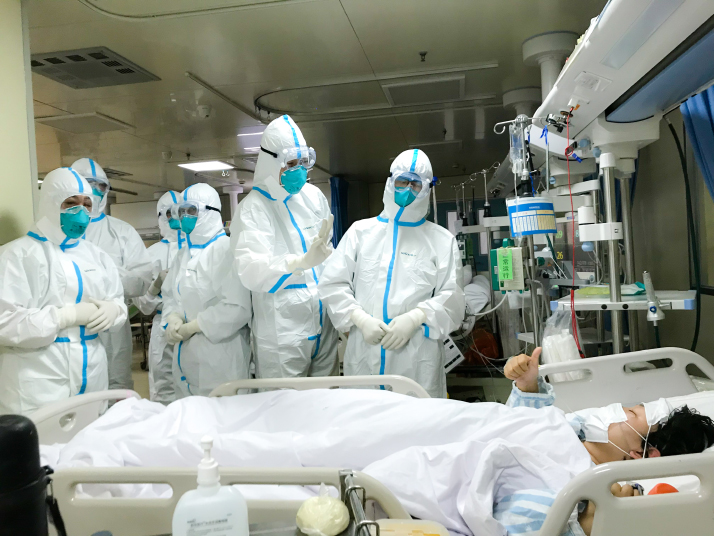
On January 27, a patient in Wuhan gives a thumbs up to the doctors and nurses who have been treating him (XINHUA)
Committed medical workers
While national support and attention were focused on Wuhan at the beginning of the epidemic, other cities in the province were also fighting a hard battle. Equipped with less medical resources, these cities were under as much pressure as Wuhan.
Su Yanli is a nurse working in one of the two hospitals that were able to admit infected patients in Hefeng County of Enshi Tujia and Miao Autonomous Prefecture at the southwest corner of the province. Far away from Wuhan, the prefecture had relatively few cases of infection.
When the county's first case was confirmed in the hospital, the crew had few medical supplies and knowledge of how to treat the patient. Su worked consecutively for four days and three nights to take care of the patient together with another doctor, while the other medical personal were urgently trained on how to handle the virus properly. She was then put into quarantine as a precaution.
"We did this so that we could have as many fit medical staff as possible for incoming patients," she told ChinAfrica. Fortunately, although poorly protected during the shift, Su was not infected.
Her husband, a policeman, was also working during the holiday. Mobility of people was strictly controlled in the county, with checkpoints at the gates of each community and police cars patrolling along the streets playing recorded warnings and guidelines.
While sending most of the medical support to Wuhan, the NHC matched 19 provinces/municipalities with the other 16 cities/prefectures of Hubei, with each one or two provinces supporting one city/prefecture. According to the commission, 25 medical teams consisting of over 3,500 members had been sent to these places by February 13, and they were told to include an additional 50 percent of staff as backup.
On February 12, a team of 119 members from Tianjin arrived at Enshi's Xujiaping Airport with medical supplies. Su said about 10 members were assigned to their county, which was a great help now that the hospital had five confirmed cases.
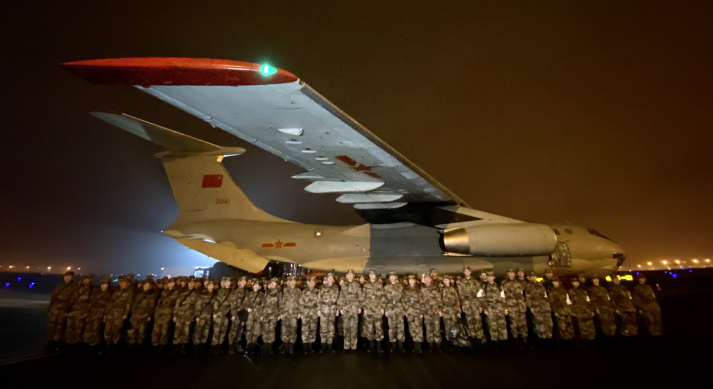
Members of a medical team from the Army Medical University gather at the Chongqing Jiangbei International Airport in southwest China before flying to Wuhan on January 24 (XINHUA)
Team effort
As the epidemic escalated, China's companies, social organizations and individuals, including overseas Chinese, quickly reacted and provided aid in various forms.
When hospitals across Hubei in severe shortage of medical supplies put their needs online and called for public help, the alumni association of Wuhan University was among the first social groups to react. Its Beijing branch initiated a fundraising program on January 24 and formed a team to look for global supplies. On January 28, their first delivery of 4,000 sterile insulation gowns arrived at one of the hospitals.
Support in the form of cash and medical supplies from companies was overwhelming. Alibaba, China's leading Internet company, raised over 230 million yuan ($32.9 million) by February 9 and set up another 1 billion yuan fund ($143 million) on January 25 to purchase medical supplies for Hubei's hospitals. Tencent, another leading Internet company, set up a 1.5-billion yuan ($215 million) fund for similar purposes.
To ease the shortage of medical supplies, many companies, including those not in the medical sector, added production lines for urgently needed supplies. In early February, three Chinese auto makers, BYD, SGMV and GAC, announced plans to set up production lines for masks and disinfectant. Other sectors which participated included manufacturers of clothing, shoes and disposable diapers.
Zhao Junyan, a 15-year-old middle school student, made headlines by bringing back 20,000 face masks in five suitcases from Indonesia to Wenzhou, Zhejiang Province in east China which had been hard hit by the epidemic. These masks were urgently sourced by Zhao's uncle, a Chinese businessman in the country. Zhao, who was spending his Chinese Lunar New Year holiday there, volunteered to bring them back.
Apart from medical supplies, tons of daily necessities such as fruit and vegetables were shipped to Hubei from across the country. These included 22 tons of bananas from a village in southwest China's Yunnan Province, which had only recently shaken off poverty. The villagers wanted to help and all they had to offer were bananas. So they spent two days picking and packing bananas and a video of them transferring bananas to a collection point on motorbikes went viral. With the help of a volunteer truck driver, their donation was sent to Huangshi City in Hubei, 1,800 km away.
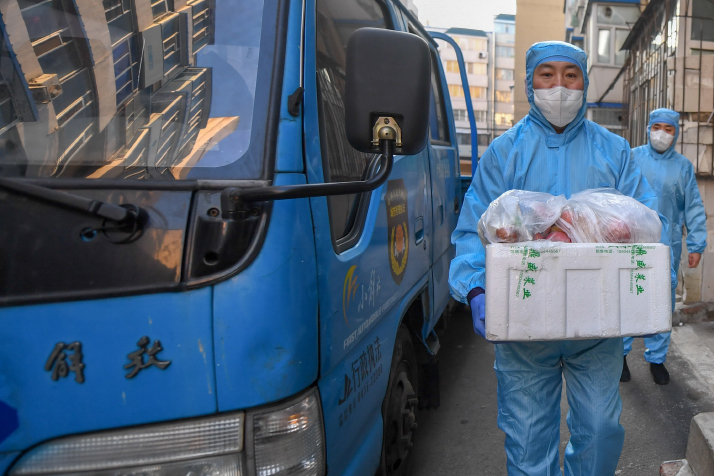
Volunteers deliver food supplies to the homes of infected residents in self quarantine in Changchun, northeast China's Jilin Province, on February 7 (XINHUA)
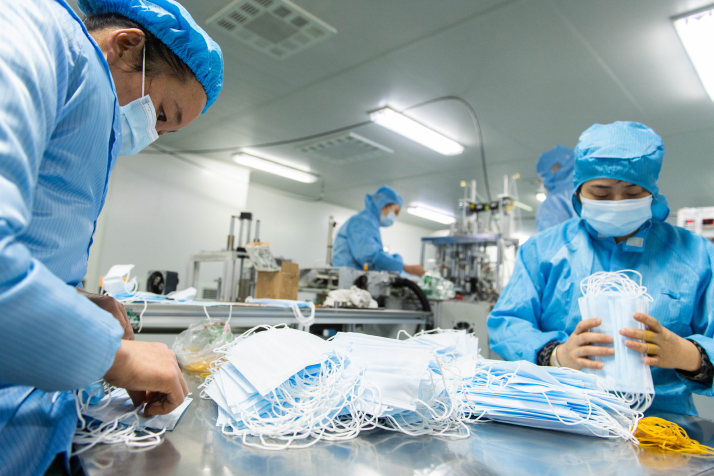
Workers package masks at a factory in Linli County, central China's Hunan Province, on January 26, the second day of the Chinese Lunar New Year (XINHUA)
International support
Since the outbreak of the epidemic, China has received great support from the international community. Many countries and international organizations, including African countries such as Algeria, Egypt and Ghana, donated medical supplies.
In an online press conference, the spokesman of the Ministry of Foreign Affairs, Geng Shuang, welcomed and expressed gratitude for the kind support from the international community.
Confidence in China from the international community came on January 31, when the WHO announced the novel coronavirus outbreak as a Public Health Emergency of International Concern (PHEIC). However, it stressed that it did not recommend limiting trade and travel to the country and spoke highly of China's prevention and containment measures. Later at a press conference, WHO Representative in the Philippines, Rabindra Abeyasinghe, praised China for its proactive effort not only to contain the outbreak in Wuhan, and other areas in China, but also to prevent the virus from spreading to other countries.
"We are very appreciative of those efforts of the Chinese Government," said Abeyasinghe.
Support also came from France. In addition to medical supplies from the French Government, the General Consulate of France in Wuhan showed its confidence in the city by remaining open during the outbreak, the only consulate in the city to do so.
"I will stay here and get over the hardship with the city," said Olivier Guyonvarch, Consul General for France in Wuhan, who stayed on at the consulate with three other French diplomatic staff.
A costly lesson
The epidemic has led to heated discussions across China's social media about wild animal protection. Investigations show that the virus originated from a seafood wholesale market, where wild animals were illegally sold for consumption. The SARS epidemic 17 years ago was also believed to be related to the consumption of wild animals.
Another much debated topic is China's disease control system. Although great improvements were seen this time, compared to China's reaction in fighting SARS in 2003, some shortcomings were also revealed.
At the 12th meeting of the Central Committee for Deepening Overall Reform held on February 14, President Xi stressed the importance of drawing lessons from the COVID-19 outbreak. Resolutions were made to improve China's prevention and control system for major epidemics and improve the response to public health emergencies.
In particular, laws on infectious disease prevention and wild animal protection will be tightened and biosafety will be included in China's national security system. Steps are also to be taken to improve movement of emergency supplies.
Although the battle against the virus is still ongoing, with new cases confirmed each day, there is also evidence suggesting the effectiveness of the efforts that the whole country has been making.
As of February 18, the number of confirmed cases in places other than Hubei has seen dropping for more than 15 consecutive days, and 14,376 patients infected with COVID-19 have been discharged from hospitals across China.
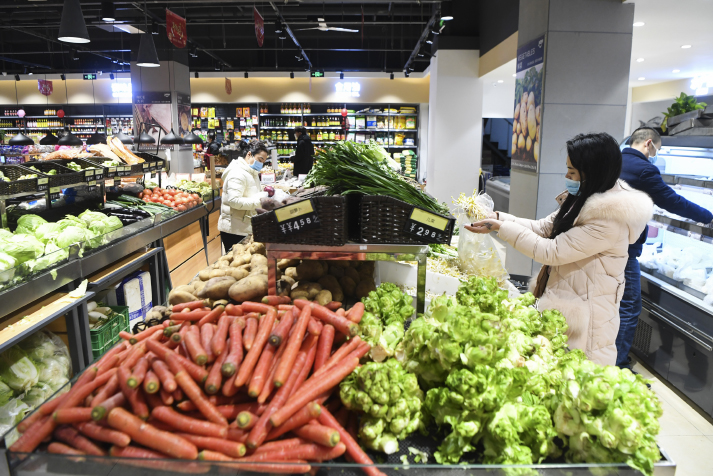
Customers buy vegetables in a supermarket in southwest China's Chongqing Municipality on February 3, Daily necessities are ensured during the epidemic period (XINHUA)
(Comments to hufan@chinafrica.cn)
|
||||||||||||
| About Us | Contact Us | Advertise with Us | Subscribe |
| Copyright Beijing Review All rights reserved 京ICP备08005356号-5 京公网安备110102005860号 |